Rio's small firms getting a helping hand
- Published
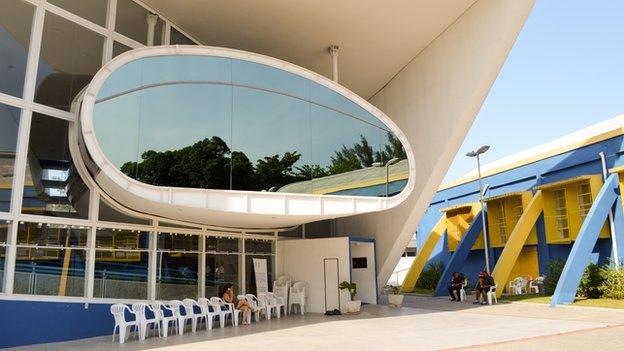
The business support classes are delivered at Rio de Janeiro's Knowledge Cloud buildings
Like millions of Brazilians, Melania Portela Xavier sees setting up her own business as the only way to earn more money and enjoy a better standard of life.
In recent years Ms Xavier has been earning the Brazilian minimum wage, which currently stands at 788 reals ($249; £165) a month, working in telemarketing.
Yet the 40-year-old, who lives in Bonsucesso, a scruffy middle class neighbourhood which lies between two sprawling favelas, or shanty towns, in the northern zone of Rio de Janeiro, says this is not enough to get by with.
"Rent for a house with one bedroom, living room, kitchen and bathroom [in Bonsucesso] is 750 reals [per month]," she says. "The minimum wage is not sufficient.
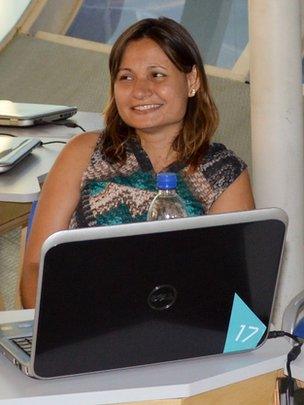
Melania Portela Xavier hopes that becoming her own boss will allow her to earn a higher income
"I'm a person who wants to work, and setting up a business is a way of earning more money."
To try to earn a higher income Ms Xavier hopes to move into the world of fashion, and start designing, making and selling artisan clothes.
To help her successfully launch and run the business, Ms Xavier is taking advantage of free classes offered by Sebrae, a Brazil-wide not-for-profit support service for sole traders and small businesses.
Sebrae's free classes in Rio are funded by the city's municipal council, the federal government, and contributions from large companies.
They teach numerous aspects of setting up and running a new business, such as bookkeeping, purchasing, price negotiation, and producing receipts.
Sebrae can also help participants get bank accounts and loans, and get their hands on technology such as chip and pin machines so they don't only have to accept cash.
'Live precariously'
The Sebrae workshops have now been running in Rio for two years, and attracted more than 5,000 participants so far.
They are held at the city's eight Knowledge Clouds, futuristic-looking buildings which provide free computer and library access across Rio's poorer northern and western zones, and which are owned and run by the city council.
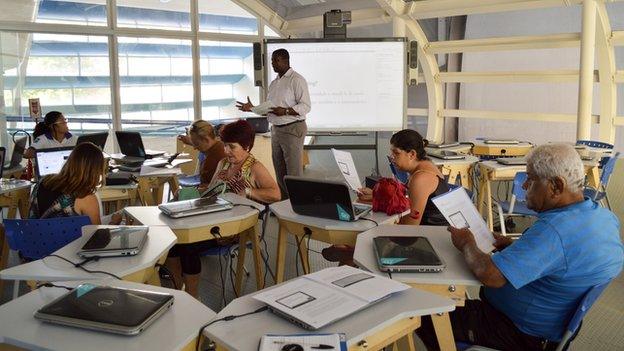
The Sebrae lessons are free and cover a wide range of business topics
For Rosa Virginia Souza de Barcelo, from Coelho Neto, also in Rio's northern zone, the Sebrae workshops are giving her a second chance.
The 64 year old mother of two was once a hairdresser, but had to give up her dream of running a salon when she got married and her husband's work took her away from Rio.
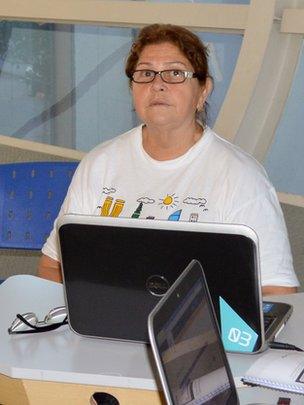
Rosa Virginia Souza de Barcelo is hoping that the classes will help her run a hairdressing business
She says: "I used to be recognised by other neighbourhoods for cutting hair, people would seek me out. But I married and then I left. It was my son's time, and I had to give up work.
"I'm doing the course to update myself on what is happening, and how to do pricing."
Meanwhile, Paulo Camoes Da Silva, who already runs his own dietary supplement business in Rio, says that thanks to the lessons he learned from attending Sebrae classes, he was able to see his profits rise "considerably".
Rodrigo Brantes, who leads Sebrae classes in Rio, says that the workshops can be particularly useful for sole traders from poorer backgrounds, who "live quite precariously day-to-day in terms of business".
He adds: "Many such traders don't have financial controls, so on a daily basis if they make a sale that is a bit more significant than usual, that money is automatically spent on something private".
Mr Brantes says that Sebra workshops can help these people better look after their cash flows, and try to build up reserves of money.
Taxation issue
Another aim of Sebrae is to encourage more Brazilian sole traders and small firms to join the formal economy, and officially register their businesses.
The knock-on impact of this is that the businessmen and women, and any staff they have, would suddenly have to pay tax.
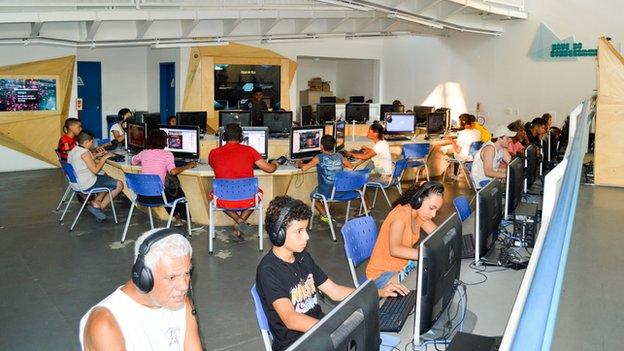
The Knowledge Clouds also allow local people to access the internet
And with an estimated four millions Brazilians working in the informal sector, there is a lot of potential tax revenues to be gathered.
Mr Da Silva adds that there are numerous benefits to going legitimate, such as being able to get a bank account and a loan.
He adds: "Today, as a legal entity I can buy products directly from manufacturers, without needing intermediaries [to buy on my behalf], which has increased my income by about 30%."
Wilson Franca dos Santos, a spokesman for Rio city council's science and technology secretary, says that if sole traders or small firms in the city register with the authorities, then they can access a wealth or additional support and advice, such as grants and loans.
He says that "if they are clandestine, then City Hall can't help them."